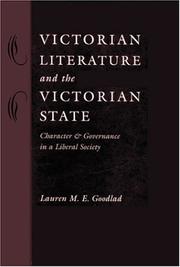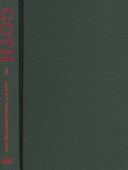| Listing 1 - 9 of 9 |
Sort by
|

ISBN: 0801869633 0801881544 9780801881541 9780801869631 Year: 2003 Publisher: Baltimore Johns Hopkins University Press
Abstract | Keywords | Export | Availability | Bookmark
 Loading...
Loading...Choose an application
- Reference Manager
- EndNote
- RefWorks (Direct export to RefWorks)
In this study, impressively grounded in literary criticism, social history, and political theory, Goodlad offers a timely post-Foucauldian account of Victorian governance that speaks to the resurgent neoliberalism of our own day.
Etat [L' ] dans la littérature --- Liberalism in de literatuur --- Liberalism in literature --- Libéralisme dans la littérature --- Problèmes sociaux dans la littérature --- Social problems in literature --- Sociale problemen in de literatuur --- Staat [De ] in de literatuur --- State [The] in literature --- English literature --- -Liberalism --- -Liberalism in literature --- Literature and society --- -Literature and state --- -Politics and literature --- -Social problems in literature --- State, The, in literature --- Liberal egalitarianism --- Liberty --- Political science --- Social sciences --- British literature --- Inklings (Group of writers) --- Nonsense Club (Group of writers) --- Order of the Fancy (Group of writers) --- Literature --- Literature and politics --- State and literature --- Authors and patrons --- Cultural policy --- Literature and sociology --- Society and literature --- Sociology and literature --- Sociolinguistics --- History and criticism --- History --- -History --- Political aspects --- Social aspects --- Great Britain --- Politics and government --- -English literature --- -Etat [L' ] dans la littérature --- Liberalism --- Literature and state --- Politics and literature --- 19th century --- 1837-1901 --- Social problems in literature. --- State, The, in literature. --- Liberalism in literature. --- History and criticism.
Book
Year: 2013 Publisher: Bloomington (Ind.): Indiana university,
Abstract | Keywords | Export | Availability | Bookmark
 Loading...
Loading...Choose an application
- Reference Manager
- EndNote
- RefWorks (Direct export to RefWorks)

ISBN: 9780822339083 9780822339212 Year: 2007 Publisher: Durham (N.C.) : Duke university press,
Abstract | Keywords | Export | Availability | Bookmark
 Loading...
Loading...Choose an application
- Reference Manager
- EndNote
- RefWorks (Direct export to RefWorks)
Book
ISBN: 9780198728276 Year: 2015 Publisher: Oxford [etc.] Oxford University Press
Abstract | Keywords | Export | Availability | Bookmark
 Loading...
Loading...Choose an application
- Reference Manager
- EndNote
- RefWorks (Direct export to RefWorks)
Book
ISBN: 1478092106 Year: 2013 Publisher: [s.l.] : Duke University Press,
Abstract | Keywords | Export | Availability | Bookmark
 Loading...
Loading...Choose an application
- Reference Manager
- EndNote
- RefWorks (Direct export to RefWorks)
Since the show's debut in 2007, Mad Men has invited viewers to immerse themselves in the lush period settings, ruthless Madison Avenue advertising culture, and arresting characters at the center of its 1960s fictional world. Mad Men, Mad World is a comprehensive analysis of this groundbreaking TV series. Scholars from across the humanities consider the AMC drama from a fascinating array of perspectives, including fashion, history, architecture, civil rights, feminism, consumerism, art, cinema, and the serial format, as well as through theoretical frames such as critical race theory, gender, queer theory, global studies, and psychoanalysis. In the introduction, the editors explore the show's popularity; its controversial representations of race, class, and gender; its powerful influence on aesthetics and style; and its unique use of period historicism and advertising as a way of speaking to our neoliberal moment. Mad Men, Mad World also includes an interview with Phil Abraham, an award-winning Mad Men director and cinematographer. Taken together, the essays demonstrate that understanding Mad Men means engaging the show not only as a reflection of the 1960s but also as a commentary on the present day. Contributors. Michael Bérubé, Alexander Doty, Lauren M. E. Goodlad, Jim Hansen, Dianne Harris, Lynne Joyrich, Lilya Kaganovsky, Clarence Lang, Caroline Levine, Kent Ono, Dana Polan, Leslie Reagan, Mabel Rosenheck, Robert A. Rushing, Irene Small, Michael Szalay, Jeremy Varon
Performing Arts / Television / History & Criticism --- Performing arts --- Show business --- Arts --- Performance art
Book
ISBN: 1299400922 0822399067 0822354020 0822354187 Year: 2013 Publisher: Durham and London : Duke University Press,
Abstract | Keywords | Export | Availability | Bookmark
 Loading...
Loading...Choose an application
- Reference Manager
- EndNote
- RefWorks (Direct export to RefWorks)
In this comprehensive analysis of the TV series Mad Men, scholars explore the groundbreaking drama in relation to fashion, history, architecture, civil rights, feminism, consumerism, art, cinema, and the serial format.
Television programs --- Programs, Television --- Shows, Television --- Television shows --- TV shows --- Television broadcasting --- Electronic program guides (Television) --- Television scripts --- Social aspects --- History and criticism. --- Mad men (Television program)
Digital
ISBN: 9781478092100 Year: 2013 Publisher: Durham London Duke University Press
Abstract | Keywords | Export | Availability | Bookmark
 Loading...
Loading...Choose an application
- Reference Manager
- EndNote
- RefWorks (Direct export to RefWorks)
Since the show's debut in 2007, Mad Men has invited viewers to immerse themselves in the lush period settings, ruthless Madison Avenue advertising culture, and arresting characters at the center of its 1960s fictional world. Mad Men, Mad World is a comprehensive analysis of this groundbreaking TV series. Scholars from across the humanities consider the AMC drama from a fascinating array of perspectives, including fashion, history, architecture, civil rights, feminism, consumerism, art, cinema, and the serial format, as well as through theoretical frames such as critical race theory, gender, queer theory, global studies, and psychoanalysis. In the introduction, the editors explore the show's popularity; its controversial representations of race, class, and gender; its powerful influence on aesthetics and style; and its unique use of period historicism and advertising as a way of speaking to our neoliberal moment. Mad Men, Mad World also includes an interview with Phil Abraham, an award-winning Mad Men director and cinematographer. Taken together, the essays demonstrate that understanding Mad Men means engaging the show not only as a reflection of the 1960s but also as a commentary on the present day.
Book

ISBN: 9780691227559 Year: 2021 Publisher: Princeton, NJ
Abstract | Keywords | Export | Availability | Bookmark
 Loading...
Loading...Choose an application
- Reference Manager
- EndNote
- RefWorks (Direct export to RefWorks)
Book

ISBN: 9781474424417 Year: 2022 Publisher: Edinburgh
Abstract | Keywords | Export | Availability | Bookmark
 Loading...
Loading...Choose an application
- Reference Manager
- EndNote
- RefWorks (Direct export to RefWorks)
| Listing 1 - 9 of 9 |
Sort by
|

 Search
Search Feedback
Feedback About UniCat
About UniCat  Help
Help News
News